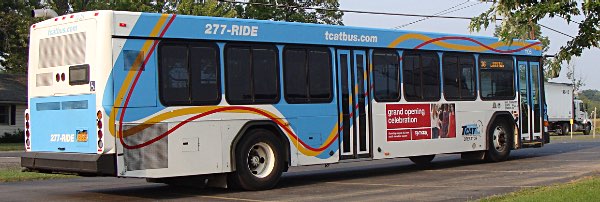- By Patty Poist
- News
 Print
Print 
In an effort to make transit more affordable for all bus riders, TCAT is planning to eliminate its two-zone fare program and revert to one single fare of $1.50 per adult ride and .75 cents for those eligible for half fare, TCAT General Manager Scot Vanderpool announced tonight at TCAT's Transit Awareness Day event at Tompkins County Public Library.
The new fare structure will go into effect at the start of TCAT's fall service period on Sun., Aug. 25. Details will be forthcoming, but those holding Zone 2 passes after Aug. 25 will be able to redeem them at full value and transfer them to Zone 1 passes.
In recent months, the TCAT Board of Directors and TCAT staff have been giving careful study to the impact fares have on low-income populations—or people typically needing transit the most — who are increasingly forced to live outside the city due to the high cost of housing in the city's core.
The TCAT Board of Directors is expected to officially approve the plan at its regularly scheduled meeting, Thurs., June 20. "We are truly pleased with this initiative toward barrier-free and equitable public transportation. The elimination of the Zone 2 fare is an important step to meet that end," said TCAT Board Member Denise Thompson, who is chairperson of the board's Transit Service Committee, which after careful study, recommended that the board drop the Zone 2 fare.
"There is an equity piece to eliminating Zone 2 fares; the lives of everyone in our community and the local economy as a whole are enriched when public transit is accessible and affordable," Vanderpool said. "TCAT feels strongly that people struggling to make ends meet should not have to pay more for their transit experience."
TCAT began charging $2.50 per adult ride and $1.25 half fare for riders boarding in Zone 2 or village and rural areas outside the greater Ithaca area in January of 2012. At the time, TCAT implemented the Zone 2 to make up for budget shortfalls TCAT was grappling with at the time and citing the high expense of operating rural service.
Nonetheless, Vanderpool said he anticipates that any cost of reverting back to a single fare will be absorbed by increased ridership as TCAT is reimbursed by the state 40.5 cents per each passenger trip and .69 cents per mile traveled.
"We've done our homework," Vanderpool said. "We cost is minimal and we feel strongly that we will be able to recover any loss of revenue relatively quickly through increased ridership."
Additionally, Vanderpool said, a one fare system simplifies riding the bus as riders and visitors do not have to first figure out what zone they are boarding in and in some cases, will no longer be required to carry two separate passes.
v15i23



